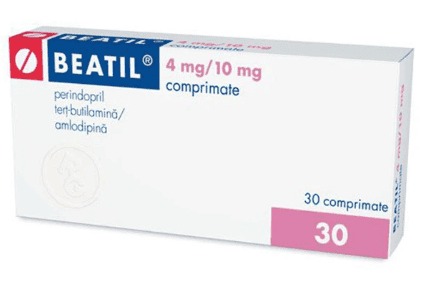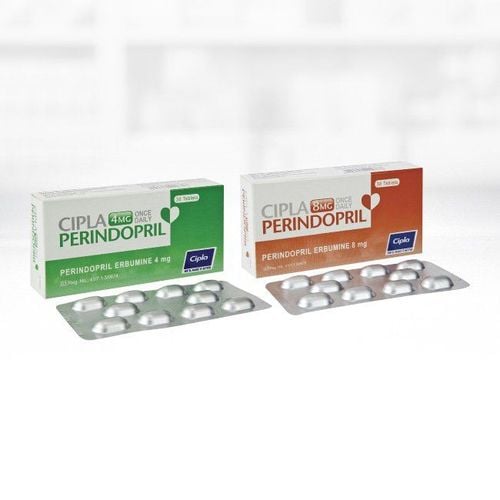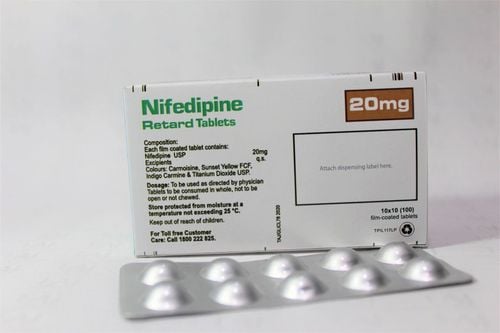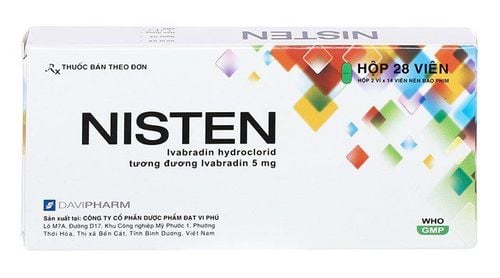This is an automatically translated article.
Beatil is a prescription drug, often recommended for the treatment of high blood pressure. The use of Beatil drug is only effective when the patient strictly adheres to the dosage and usage of the doctor. Please refer to the article below for useful information about this drug.
1. What is the effect of Beatil?
Beatil drug includes 2 main active ingredients, Perindopril and Amlodipine. It is effective as an alternative in idiopathic hypertension and/or stable coronary artery disease in patients already controlled at similar concentrations with perindopril and amlodipine.
Besides proven uses, Beatil is not allowed to be prescribed in the following cases to ensure the safety of the patient's health. Specifically:
Patients with hypersensitivity to any component of Beatil Angioedema hereditary or spontaneous. Pregnant women in the 2nd and 3rd trimesters People with strong hypotension. State of shock, including cardiogenic shock. Obstruction of outflow from the left ventricle (eg, multiple aortic stenosis). Unstable angina. Heart failure after acute myocardial infarction (within the first 28 days).
2. Dosage and how to use Betil
Beatil is taken orally. Patients can consult their doctor about when to take the drug to be most effective. The dose of Beatil drug is adjusted according to the patient's medical condition. Specifically, patients can refer to the dosage below:
Adults apply the oral dose of 1 tablet/day. Patients with renal failure and the elderly need to adjust the dosage according to the doctor's prescription. Patients with liver failure should consult their doctor about the dose of Betil. Dosage of the drug Beatil for children is not applicable. Note: The above dosage is for reference only. The specific dose depends on the condition and the progression of the disease. To get the right dose, you need to consult your doctor or healthcare professional.
There have been reports of overdoses of the drug Betil. Accordingly, patients may experience a drop in blood pressure that makes them feel dizzy or lethargic when overdosing on the drug. According to experts, to overcome this situation, patients need to strictly follow the instructions on the dose of Betil. If symptoms appear, the patient should be placed on his or her back with the legs elevated.
3. Side effects of the drug Betil
Despite carefully weighing the benefits and risks that Beatil brings. However, patients are still likely to experience common side effects such as headache, lightheadedness, dizziness, tingling and tingling sensations, drowsiness, visual disturbances, ringing in the ears, palpitations, and palpitations. (too fast heartbeat), flushing (feeling hot in the face)... These signs are usually not too serious, they can go away on their own in a short time. Some of the less common side effects of Beatil include: sleep disturbances, tremors, fainting (temporary loss of consciousness), loss of pain sensation, rhinitis (stuffy or runny nose), changes in bowel habits Convenience, hair loss ...
Very rarely, patients using Beatil experience the following side effects: cardiovascular disorders (irregular heartbeat, angina, heart attack and stroke), increased pneumonia eosinophils (rare type of pneumonia), erythema multiforme, hypertonia (increased abnormal muscle tension), vasculitis (skin vasculitis), gingival edema, hyperglycemia...
These are not all the side effects of Beatil. If during the course of treatment with the drug, the patient encounters any unusual signs that are suspected to be caused by the drug, it is necessary to inform the doctor.
4. Beatil drug interactions
In medicine, drug interactions often occur because patients accidentally combine one or a group of drugs together. This condition can increase the side effects of the treatment or decrease its effectiveness. To avoid drug interactions, the patient needs to inform the doctor about the drugs that you are taking. From there, the doctor will decide whether to prescribe the drug or not? Some drugs/drugs interact with Beatil such as:
Lithium (used to treat manic and depressive episodes) Estramustine (used to treat cancer) Potassium-sparing diuretics (spironolactone, triamterene), supplements potassium or potassium-containing salts. The following drugs require caution when used in combination with Beatil. These are:
Anti-hypertensive drugs Non-steroidal anti-inflammatory drugs (eg, ibuprofen) for pain relief or high doses of aspirin Anti-diabetic drugs (eg: insulin) Antipsychotic drugs such as anti-depressants, anti-anxiety drugs , schizophrenia... Immunosuppressants (drugs that decrease the body's defenses) Allopurinol (to treat gout) Procainamide (to treat irregular heartbeats) Vasodilators including nitrates (substances that dilate blood vessels) Heparin (an anticoagulant) Ephedrine, noradrenaline or adrenaline (used to treat hypotension, shock or asthma) Baclofen or dantrolence
5. Be careful when using the drug Betil
During the course of drug treatment, if the patient develops angina attacks, the patient should consult his doctor about whether to continue using the drug to bring the best health benefits. Angioedema of the face, extremities, lips, mucous membranes, tongue, glottis and/or larynx was noted. Beatil has the potential to increase serum potassium because of its active ingredient perindopril. Caution should be exercised when increasing the dose in elderly patients. Beatil does not have a great impact on people who often operate machinery and drive vehicles. However, patients should still be cautious during drug treatment. Pregnant women, especially during the first trimester, should not use this medicine. Women who are breastfeeding are not advised to take this medicine. If treatment with Betil is mandatory, breast-feeding should be discontinued.
Please dial HOTLINE for more information or register for an appointment HERE. Download MyVinmec app to make appointments faster and to manage your bookings easily.













